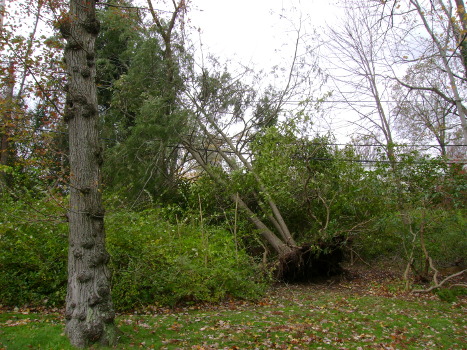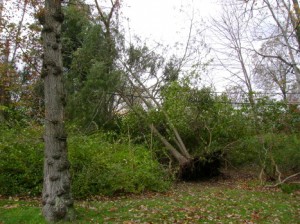Human Interest
Hurricane Sandy: lessons and failures

Hurricane Sandy shows that central relief plans often fail, and personal, household, and neighborhood efforts, when people make them, work best of all.
Hurricane Sandy: it’s personal
Hurricane Sandy is very personal for your correspondent. To set the scene: I live in Millburn Township (home of the Paper Mill Playhouse), in the southwest corner of Essex County in New Jersey. The Jersey Central Power and Light Company serves Millburn and the neighboring town of Livingston; Public Service Electric and Gas serves the rest of Essex County, including Newark.
At 5:32 p.m. EDT on Monday, October 29, 2012, your correspondent was typing at his console. Suddenly it went dark. The secondary computer, then playing Fox News Channel’s program, went dark and silent. The room went dark. The house went dark.
And so began 120 hours of shelter-in-place. At first the only houses that were dark were on my block. I called JCP&L to report my problem. I reasoned then that a tree or branch had cut or shorted out my circuit. I probably have the least reliable circuit in the neighborhood.
Three hours later, a nearby street light went dark. And then the only house I could see with any lights in it, belonged to a neighbor who had a standby generator that ran on piped-in natural gas.
By next morning, the wind died. But another neighbor’s tree lay across the street, cutting it off. Several trees in my yard broke off and fell during the night. One cut off my driveway and also blocked one lane of the main thoroughfare. (Three men brought chainsaws and chopped that up for me when they spotted me trying to chop it up myself with an ax.)
As far as anyone knew, several trees uprooted during the night. Most of these fell. No one died in our neighborhood. My neighbor with the generator offered to store a few perishables in his refrigerators, ran an extension cord to the house next door to him, and let me recharge my cell phones once a day. But without power, I had no telephone service. This wasn’t merely the “cordless phone base unit syndrome.” My telephone service was a connection to a fiber-optic network, and for that I needed power to a special network panel in my home. And so, when the Millburn Office of Emergency Management (OEM) sent message after message to people, I got none of these messages until much later. Memo to OEM’s everywhere: telephone messages help no one who can’t answer the phone!

An uprooted tree leans against another tree and tangles with an electric line after Hurricane Sandy passes through. Photo: CNAV
Worse yet, JCP&L had no set-up to tell people what was happening in their town. I might as well say now what I learned later: Hurricane Sandy knocked down six utility poles, and when they fell, the main power line fell with them. Worse, Hurricane Sandy totally wrecked the two power substations that serve Millburn. But I did not know this. I lived in a cocoon, with no newspaper, and no mail, for three days. All I had was a radio, tuned to WKXW in Trenton, NJ. On the third day the announcer mentioned rumors of looting in several New Jersey cities. This looting did not reach our neighborhood, but we have only the Lord to thank for that.
We heard about (putative) President Barack Obama visiting Atlantic City on the second day. CNAV has a source, whom I shall call The Eagle, in Wall Township in Monmouth County. (He still does not have power to his home.) That photo-op disgusted him, and revealed Governor Chris Christie as an opportunist, trying to curry favor with someone who happens to be, or at least everyone believes him to be, the President. (Regular readers will remember that, as far as CNAV is concerned, he is not the President. His father was a British colonial subject, and that alone makes him other than a natural born citizen.)
That photo-op was all I ever heard about any federal response. Your correspondent never saw hide nor hair of FEMA, or of the vaunted FEMA Youth that graduated its first class a week before Hurricane Sandy began her baleful run up the East Coast.
If anyone at all “came through” for anyone in Millburn, it was, ironically, JCP&L. On Day Four, their contract tree surgeons (Asplundh Tree Experts) came to my home and chopped down the spruce tree that uprooted and tangled itself in the wires when Hurricane Sandy passed through. The next day, they did the same for my neighbor with the generator. Then on Day Six, contract linemen came and made minor repairs to the line serving my block.
Finally, at about 5:45 p.m. EDT, I heard someone’s security system sound an alarm. Then I heard my system sounding its low-battery alarm. But how could that be? Then I realized that my kitchen ceiling lights were shining.
And so my ordeal ended, after more than 120 hours. I have not even begun to count the cost of cleanup and replacing spoiled food. And only then did I learn how badly JCP&L’s infrastructure suffered from Hurricane Sandy.
Bitter lessons
The first thing I learned is that the United States Postal Service’ historical motto is a sick joke. Recall what the Greek historian, Herodotus, said in his Inquiries about the Persian Post Express:
Neither snow, nor rain, nor heat nor gloom of night stays these couriers from the swift completion of their appointed rounds.
Benjamin Franklin adopted that motto for the United States Post Office Department. The New York City Post Office displays that motto above its ornamental string course. And, I repeat: that’s a joke. I received no mail at all until Day Five, and even then the mail was three days old.
The second: government services are not reliable. Did you know that the White House and FEMA both sent people in storm-stricken areas to a Web site? Hel-lo-ooo! No power means they’re off-line!
The New Jersey governor’s office has a site for information on Hurricane Sandy relief and restoration. Fine, if you have a generator (but not one that runs on gasoline! Try getting gas now, when the gas stations can’t pump it, because they have no power!). If not, then someone has to reach you, somehow, with this information. (First Energy, parent company of JCP&L, keeps an outage map, So does PSE&G.)
Solving the problem
The problems that Hurricane Sandy showed us, are that we don’t communicate as neighbors. Worse, we’ve gotten used to saying,
Let the government worry about it. Leave me alone.
In a disaster like Hurricane Sandy, that doesn’t go. If you have telephone service and your neighbors don’t, how are they to know what your local OEM told you? If you’re not sure that they can get this information, stir around and find out. “MYOB,” with apologies to Ann Landers and Abigail Van Buren, doesn’t cut it. It is every neighbor’s business that every other neighbor knows what could help him.
The Eagle told CNAV that in Florida and the Southeast, they know: don’t expect the government to reach you for seventy-two hours. So they plan for that. So should we all.
The secret is what a republic means. A republic has many levels of government, each having a particular area to take care of. Good republican government includes being ready, personally and as a neighborhood, for disaster.
Hurricane Sandy showed that city government often failed to reach the people it needed to reach most of all. State government did even less well. And the federal government? Nowhere to be found. And no one should have expected them to respond.
Is Hurricane Sandy “Obama’s Katrina”? Maybe. Or maybe not. But Hurricane Sandy should remind us to rely on ourselves more than we do, and organize with friends and neighbors before disaster strikes, to be ready when it does strike.
[subscribe2]
Terry A. Hurlbut has been a student of politics, philosophy, and science for more than 35 years. He is a graduate of Yale College and has served as a physician-level laboratory administrator in a 250-bed community hospital. He also is a serious student of the Bible, is conversant in its two primary original languages, and has followed the creation-science movement closely since 1993.
-

 Clergy2 days ago
Clergy2 days agoThrough All Of The Media Distractions, You Are Being Incrementally Dispossessed! Look At The Countries That Are Now Overrun By Immigrants
-

 Civilization4 days ago
Civilization4 days agoThe Art of the Iran Deal
-

 Civilization2 days ago
Civilization2 days agoHear O Israel — How do I hate thee?
-

 Executive2 days ago
Executive2 days agoLaura Loomer prompts NSC housecleaning
-

 Civilization4 days ago
Civilization4 days agoSpring elections – mixed results
-

 Executive3 days ago
Executive3 days agoTariffs, trade, and taxes
-

 Executive4 days ago
Executive4 days agoWaste of the Day: Over $1 Billion for Foreign Shrimp
-

 Civilization4 days ago
Civilization4 days agoRevealed: Pro-Kamala Social-Media Millions That Couldn’t Sync ‘Brat’ With ‘Democrat’



Michael Alan Kline Sr liked this on Facebook.
Terry –
I cannot imagine how you must have felt when your electrical power went out. If that happened where I am at; I would feel that someone taped my mouth shut.
This natural disaster in reference to big government tells me at least 2 things:
1) The federal government continues to never be adequately prepared. It had a whole week to position relief supplies. Presently, [now] there is a shortage of clean drinking water to be distributed. Residents who were hard hit were offered cocoa and cookies when many of them needed warm clothing and blankets.
2) Politicians are quick to do the easy thing and present themselves before the media. The love fest of Gov. Christie and Barack Obama was sickening.
More of my Hurricane Sandy thoughts can be accessed on my [personal] authored blog:
“Obama’s big talk and big government fails: Hurricane Sandy’s hard pressed survivors are evidence:”
link to moralmatters.org
Pastor emeritus Nathan M. Bickel
http://www.thechristianmessage.org
http://www.moralmatters.org
“Hurricane Sandy knocked down six utility poles, and when they fell, the main power line fell with them.”
We bury ours for that very reason. It’s also heavily forested around here so having power lines on poles is frankly insane.
“CNAV has a source, whom I shall call The Eagle, in Wall Township…”
…whose identity I now know.
Nathan M. Bickel liked this on Facebook.
but compared to the Republican response to Katrina, this went pretty well.
I dunno, maybe its coming from a state where power outages are frequent every winter, but I find it hard to feel pity for people who weren’t prepared.
You conveniently forget that Governor Blanco of Louisiana delayed even asking for federal assistance. And that Mayor Ray Nagin of New Orleans let a bunch of school buses get ruined in the flood waters.
And frankly, I still see nothing but posturing from the FedGov.
Don’t try to tell me, a direct witness, what is and what is not going on and being done in New Jersey.
No offense, I know you guys were hit bad, but it doesnt sound terrible. Yeah the Federal Government should be doing a better job, but what you are describing literally happens almost every other winter in Maine. Trees on electrical lines (though we never lose phone service), loss of power for days…considering the huge area hit by the hurricane (and the massive flooding and such experienced elsewhere) your complaints sound like whining. Learn how to live without the internet and TV.
Maybe that explains your ignorance of, or failure to understand, the news. You don’t keep up with it, because you can’t.
My point was that the entire country should be prepared for things like this. It should not be considered a disaster just because people don’t have power. People from the south who endured this hurricane are confused because, to them, it seems like such a small deal. Stop whining.
Nobody’s whining. You missed the point of my article, anyway. It was not to criticize FEMA for not helping. It was to criticize the federal government for making a false promise of competence and then not delivering. And to make the case that, if Mitt Romney did decide to abolish FEMA and devolve its functions to State (and better yet, local) OEMs, that wouldn’t be the calamity that Putative President Obama says it is.
[…] Sandy cut her destructive swath across New Jersey last Monday. The next day, (putative) President Barack Obama landed in Atlantic […]
Terry sorry to hear of your trouble I truly know where you are coming from because I have been there. I have been though a couple of hurricanes and this is what I personally seen what FEMA does.
They set up a station at a county park and you can get Ice and MRE’s. Just show ID to make sure you are a local. They send equipment down my street to pick up debris. I lost two trees and I gave one FEMA contractor 50 bucks to remove one of my stumps. If your roof is damaged you can get them to put blue tarp on your roof. They have a program that will reimburse you for generators and chainsaws. I am sure there are other things they do (FEMA trailers) but this is what I saw. None of these activates is anything that will be set up in three days.
Florida power and light (FPL) is another story. They do not maintain their poles and infrastructure like you think they should especially in a hurricane prone state. I was out of power for ten days after Wilma. There are stories of rotten poles hanging more from the wires than actually holding up the wires. The storm knocks down FPL’s decrepit poles and months later we get a monthly hurricane repair surcharge. A surcharge for repairs that would not be needed if their infrastructure was properly maintained.
As far as Gas stations go Florida made it mandatory for gas stations to have back up generators or have electrical connections installed so you can connect a portable generator to the stations. That way the Gas shortages will not occur.
Sorry that you have to experience this it I really hate hurricanes.
Atom Heartmother liked this on Facebook.
[…] it’s simply an excuse to empower government and allow you to do nothing. This is evident from recent events. All these federal agencies are created to dis-empower us to create our dependency on them. We must […]
[…] do it after the next Hurricane Sandy tore out all the hanging cables. (In Millburn, Hurricane Sandy blew down six utility poles and wrecked two substations. That alone cut power to eight thousand homes and […]